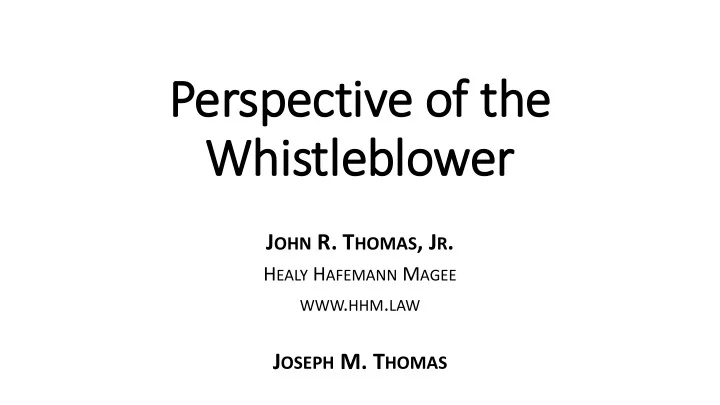

Perspective of the Whis istleblower J OHN R. T HOMAS , J R . H EALY H AFEMANN M AGEE WWW . HHM . LAW J OSEPH M. T HOMAS
Overv rview of Legal Practice • Represent whistleblowers in a variety of cases, primarily False Claims Act cases. • Founder and national Chair of the Federal Bar Association Qui Tam Section • Prior experience as US Marine attorney.
Fals lse Cla laims Ac Act • “Lincoln Law” • Qui Tam provisions allow private whistleblowers to bring suit on behalf of the United States Government. • Elements: (1) Falsity; (2) Scienter (Knowledge); (3) Materiality; and (4) Damages • Treble Damages • Whistleblowers (“Relator”) may receive up to 30% of the recovered amount.
Whistleblower Goals • Scientific Integrity • Protection from Retaliation • Transparency • Saving Resources • Consequences for Wrongdoers
Dis isclaimer • Some information related to the case remains non-public, and we will not share any such information in this presentation. • The settlement in this case did not involve an admission on the part of Duke as to liability or any of the factual particulars of the case. • Any factual analysis are our impressions and opinions.
US ex rel. Thomas v. . Duke University, et al. l. • Core Laboratory • 8 years of pulmonary research • ~50 publications • ~35 grants
Procedural History ry of Case • Filed May 2013 • DOJ investigated for 4 years, Litigated for 2 years • 52 depositions, 15+ experts • Settled in November 2018 • $112.5M USD
Joe’s Perspective • Observations • Motivations • Factors leading toward legal route • Outcomes
Challenges • FCA is an anti-fraud statute – usually used for Medicare fraud and procurement fraud, not scientific fraud. • Objective vs. Subjective • Materiality
Takeaways • Legal system can have a role in addressing research misconduct • Institutions need to better understand whistleblower motivations and respond • Increased legal (and financial) exposure may lead many universities to increase efforts to address research misconduct
Questions? jt jt@hhm.law
Recommend
More recommend